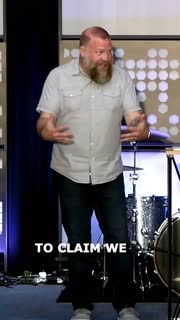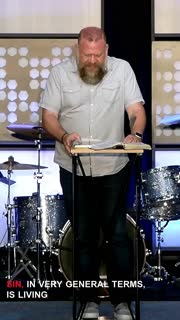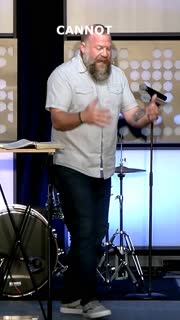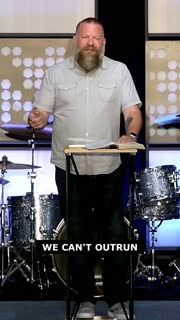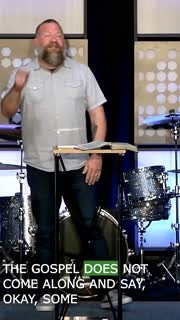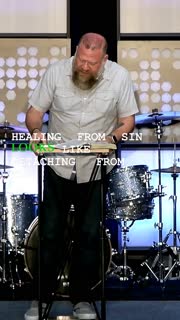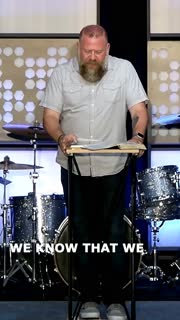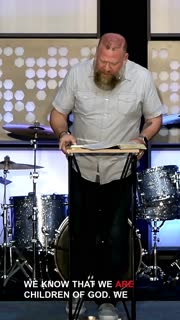Understanding Sin and Certainty in Our Faith
Summary
### Summary
Today, we conclude our summer series, "Prove It," by delving into the final chapter of 1 John. Throughout this series, we've explored how to demonstrate our faith, love, and belief in God. John’s letter is not about advanced theology but foundational truths every believer should grasp. As we wrap up, we focus on 1 John 5:16-21, where John discusses sin, particularly distinguishing between sins that lead to death and those that do not. This passage challenges the common notion that all sins are equal in God's eyes. John clarifies that the death he refers to is spiritual, not physical, emphasizing the gravity of persistent, unrepentant sin.
John's message is clear: true believers cannot live in persistent disobedience. While believers may struggle with sin, those who revel in it and have no remorse do not truly know God. This distinction is crucial for understanding our spiritual state and the importance of repentance. John also emphasizes the certainty we can have in our relationship with God. He uses the word "know" repeatedly to stress that we can be sure of our salvation and our standing with God.
We also explored the concept of sin in three dimensions: sin done by us, sin done to us, and sin done around us. Each type affects us differently, but all require healing. Healing from sin involves moving through layers, from gross sins to unconscious sins and attachments, which can become idols in our lives. John’s final exhortation to keep ourselves from idols underscores the importance of detaching from worldly things and attaching to God.
As we prepare to enter a new series on spiritual disciplines, let’s remember that our journey involves both avoiding sin and healing from its effects. We can be certain of our identity in Christ, our victory over sin, and our eternal life. Let’s live out these truths with confidence and prove our faith through our actions.
### Key Takeaways
1. The Distinction Between Sins: John differentiates between sins that lead to death and those that do not, emphasizing that persistent, unrepentant sin signifies a lack of true knowledge of God. This distinction challenges the notion that all sins are equal and highlights the importance of repentance and transformation in the believer's life. [05:40]
2. Certainty in Our Relationship with God: John repeatedly uses the word "know" to assure believers of their standing with God. This certainty is foundational to our faith, allowing us to live confidently, knowing we are children of God, overcomers in Christ, and possessors of eternal life. [14:47]
3. Three Dimensions of Sin: Sin affects us in multiple ways: sin done by us, sin done to us, and sin done around us. Each dimension requires healing, not just avoidance. Understanding these dimensions helps us address the broader impact of sin on our lives and seek comprehensive healing. [17:26]
4. Healing from Sin: Healing involves moving through layers of sin, from gross, obvious sins to unconscious sins and attachments. This process requires us to detach from worldly idols and attach to God, ensuring our spiritual growth and freedom from sin's grip. [20:48]
5. Living Out Our Faith: John’s letter encourages us to not only know our faith but to live it out with certainty. This involves staying away from sin, healing from its effects, and proving our faith through our actions. As believers, we are called to demonstrate our faith in tangible ways, showing the world the transformative power of Christ. [30:01]
### YouTube Chapters
[0:00] - Welcome
[01:24] - Introduction to 1 John 5
[02:41] - Understanding Sin and Death
[04:06] - The Concept of Missing the Mark
[05:40] - Differentiating Types of Sin
[06:59] - Persistent Sin and Spiritual Death
[08:32] - True Believers and Disobedience
[10:04] - Signs of Rebellion and Disobedience
[11:44] - Praying for the Rebellious
[13:16] - William Barclay on Sin Leading to Death
[14:47] - Certainty in Our Relationship with God
[16:00] - Identifying Our Spiritual Group
[17:26] - Three Dimensions of Sin
[20:48] - Layers of Healing from Sin
[26:28] - Example: Anger Through the Layers
[29:01] - Identifying Idols in Our Lives
[30:01] - Big Picture Application of 1 John
[32:52] - Closing Prayer
Study Guide
### Bible Reading
1 John 5:16-21 (NIV)
### Observation Questions
1. What does John mean by "sin that leads to death" and "sin that does not lead to death"? How does he differentiate between the two? [05:40]
2. According to 1 John 5:18, what is the relationship between being born of God and continuing to sin? [02:41]
3. How does John emphasize the certainty of our relationship with God in 1 John 5:18-20? [14:47]
4. What is John's final exhortation in 1 John 5:21, and why is it significant? [02:41]
### Interpretation Questions
1. Why does John stress the importance of knowing our standing with God? How does this certainty impact a believer's life? [14:47]
2. How can persistent, unrepentant sin indicate a lack of true knowledge of God? What are the implications for someone who lives in such a state? [06:59]
3. What are the three dimensions of sin mentioned in the sermon, and how do they affect us differently? [17:26]
4. How does the process of healing from sin involve detaching from worldly idols and attaching to God? What does this look like in practical terms? [20:48]
### Application Questions
1. Reflect on your own life: Are there any persistent sins that you struggle with? How can you seek repentance and transformation in these areas? [06:59]
2. John emphasizes the certainty of our relationship with God. How can you cultivate a deeper sense of assurance in your faith? What practices or habits might help you in this journey? [14:47]
3. Consider the three dimensions of sin: sin done by us, sin done to us, and sin done around us. Which dimension do you find most challenging to address, and why? [17:26]
4. Healing from sin involves moving through layers, from gross sins to unconscious sins and attachments. Identify one area in your life where you need healing. What steps can you take to begin this process? [20:48]
5. John warns against idols in our lives. What are some potential idols you might be holding onto? How can you begin to detach from these and attach more fully to God? [24:58]
6. How can you live out your faith with confidence, demonstrating the transformative power of Christ in your daily actions? Share a specific example of how you can do this in the coming week. [30:01]
7. Think about someone you know who might be running from God or living in persistent disobedience. How can you pray for them and support them in their journey back to God? [11:44]
Devotional
Day 1: The Gravity of Persistent, Unrepentant Sin
True believers cannot live in persistent disobedience. John differentiates between sins that lead to death and those that do not, emphasizing that persistent, unrepentant sin signifies a lack of true knowledge of God. This distinction challenges the notion that all sins are equal and highlights the importance of repentance and transformation in the believer's life. Persistent sin, according to John, leads to spiritual death, not physical death. This means that a life characterized by ongoing, unrepentant sin is a sign that one does not truly know God.
Understanding this distinction is crucial for believers. It calls us to examine our lives and ensure that we are not living in a state of rebellion against God. While we all struggle with sin, the key is our response to it. Do we repent and seek God's forgiveness, or do we continue in our disobedience without remorse? This reflection is vital for our spiritual health and our relationship with God. [05:40]
1 John 5:16-17 (ESV): "If anyone sees his brother committing a sin not leading to death, he shall ask, and God will give him life—to those who commit sins that do not lead to death. There is sin that leads to death; I do not say that one should pray for that. All wrongdoing is sin, but there is sin that does not lead to death."
Reflection: Is there a persistent sin in your life that you have not repented of? What steps can you take today to seek God's forgiveness and turn away from this sin?
Day 2: Assurance of Our Relationship with God
John repeatedly uses the word "know" to assure believers of their standing with God. This certainty is foundational to our faith, allowing us to live confidently, knowing we are children of God, overcomers in Christ, and possessors of eternal life. This assurance is not based on our feelings or circumstances but on the truth of God's Word and His promises.
As believers, we can have confidence in our relationship with God. This certainty empowers us to live boldly for Christ, knowing that our salvation is secure. It also provides comfort and peace, especially in times of doubt or difficulty. By grounding our faith in the knowledge of God's promises, we can navigate life's challenges with assurance and hope. [14:47]
1 John 5:13 (ESV): "I write these things to you who believe in the name of the Son of God, that you may know that you have eternal life."
Reflection: How does the assurance of your relationship with God impact your daily life? In what ways can you remind yourself of this certainty when you face doubts or challenges?
Day 3: The Three Dimensions of Sin
Sin affects us in multiple ways: sin done by us, sin done to us, and sin done around us. Each dimension requires healing, not just avoidance. Understanding these dimensions helps us address the broader impact of sin on our lives and seek comprehensive healing. Sin done by us involves our own actions and choices that go against God's will. Sin done to us includes the wrongs and injustices we experience from others. Sin done around us encompasses the pervasive presence of sin in the world that affects us indirectly.
Recognizing these dimensions is essential for our spiritual growth. It allows us to seek God's healing and restoration in all areas of our lives. By addressing sin in its various forms, we can experience deeper freedom and wholeness in Christ. [17:26]
James 4:17 (ESV): "So whoever knows the right thing to do and fails to do it, for him it is sin."
Reflection: Reflect on the three dimensions of sin in your life. How can you seek God's healing for sins done by you, to you, and around you?
Day 4: Layers of Healing from Sin
Healing involves moving through layers of sin, from gross, obvious sins to unconscious sins and attachments. This process requires us to detach from worldly idols and attach to God, ensuring our spiritual growth and freedom from sin's grip. Gross sins are the blatant, visible sins that are easier to identify and confess. Unconscious sins are the deeper, hidden sins that we may not be immediately aware of. Attachments are the things or people we place above God, which can become idols in our lives.
This layered approach to healing is crucial for our spiritual journey. It calls us to continually examine our hearts and lives, allowing the Holy Spirit to reveal and heal areas of sin and attachment. By doing so, we can grow closer to God and experience true freedom in Christ. [20:48]
Psalm 139:23-24 (ESV): "Search me, O God, and know my heart! Try me and know my thoughts! And see if there be any grievous way in me, and lead me in the way everlasting!"
Reflection: What are some unconscious sins or attachments in your life that you need to address? How can you invite God to reveal and heal these areas?
Day 5: Living Out Our Faith
John’s letter encourages us to not only know our faith but to live it out with certainty. This involves staying away from sin, healing from its effects, and proving our faith through our actions. As believers, we are called to demonstrate our faith in tangible ways, showing the world the transformative power of Christ. Living out our faith means aligning our actions with our beliefs, allowing our lives to reflect the love and truth of God.
This call to action is a vital aspect of our Christian walk. It challenges us to move beyond mere knowledge and into practical application. By living out our faith, we become witnesses of God's grace and power, impacting those around us and bringing glory to His name. [30:01]
James 2:17 (ESV): "So also faith by itself, if it does not have works, is dead."
Reflection: In what specific ways can you live out your faith today? How can your actions reflect the transformative power of Christ to those around you?
Quotes
1. "It's one thing to claim we have faith in God, it's another thing to prove it. And so John has been helping us understand how can we prove to ourself and to others that we know God? How can we prove to ourself and others that we love God? And how can we prove to ourself and others that we believe in God? He wants us to be very certain about those things." [01:24] (21 seconds)
2. "Sin, in very general terms, is living for ourself and satisfying our own needs. And here's the thing with that. We don't need God for that. We don't need God's help to live for ourself and satisfy our own needs. We could do that on our own. At least we can think we can do that on our own." [06:59] (19 seconds)
3. "You cannot be persistently disobedient in your sin and still be a true follower of Christ. Why? Why do I believe that? Well, I don't believe it because it's... That would be awesome, personally. Because some people are like, no, no, no, you can come to Jesus and then just whatever. Do whatever. Live however you want to live. Doesn't matter. That would be awesome, wouldn't it?" [08:32] (23 seconds)
4. "We can't outrun the Holy Spirit. We're not that fast. We're not that strong. He is always faster and always stronger than we are. So what do we do? We pray for those people. We pray. We pray harder than we've ever prayed for anything about those people, for their eyes to be opened and hearts to be opened and for the blinders to come across that the enemy has put in their life to keep them from seeing the truth." [13:16] (25 seconds)
5. "The gospel does not come along and say, okay, some of you are sick with sin, and some of you doing pretty well. The gospel doesn't say that. The gospel comes along and says, listen, we all have been diagnosed with the terminal disease called sin, and some of us know it. That's the gospel to me, because those of us who know, then we're like, well, what's the answer? Please give me the antidote. Well, then we turn to Jesus." [20:05] (34 seconds)
6. "Healing from sin looks like detaching from the things of this world and attaching to God himself. That's why we're going to do airplane mode starting next week. We're going to learn how to do this. But every sin that we could do travels through these four layers as we heal." [25:30] (18 seconds)
7. "We know that we know him. There's so many things to be uncertain about in this life, but that is not one of them. Our relationship with God is not one of them. We can know with certainty where we stand with God. And if you don't, it's not because you can't. It's because you haven't learned it yet. Because we can know for certainty where we stand." [30:45] (23 seconds)
8. "We know that we are children of God. We have been called God's children. He has adopted us into his family. He calls us. He calls us his beloved sons and daughters of the most high king. What is anybody going to do to you? What are they going to say about you? They say something about you, put you in a bad mood or whatever. My daddy thinks I'm awesome. He says I'm awesome." [31:27] (24 seconds)
9. "We know that we have passed from death to life and we have eternal life. Listen, we don't have to wonder if we stand in a good place with God. I can't tell you. I can't tell you how many people I've met that I know they lay their head down at night and they can't really fall off to sleep because they're thinking, was today a good day? Did I do enough good? Did I make God proud today?" [32:11] (26 seconds)
10. "Many people claim to have faith. Awesome. Arrows Church, let's be a church that can prove it." [32:52] (9 seconds)
